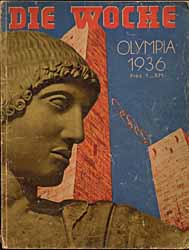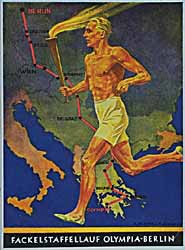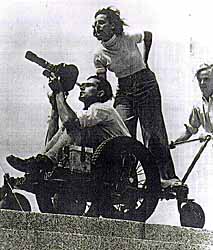|
|
|
|
Germany skillfully promoted the Olympics with colorful posters and magazine spreads. Athletic imagery drew a link between Nazi Germany and ancient Greece. These portrayals symbolized the Nazi racial myth that superior German civilization was the rightful heir of an "Aryan" culture of classical antiquity. Concerted propaganda efforts continued well after the Olympics with the international release in 1938 of Olympia, Leni Riefenstahl's controversial film documentary of the Games.
The Nazis reduced their vision of classical antiquity to ideal "Aryan" racial types: heroic, blue-eyed blonds with fine features like those on classical statues.
|

 The special Olympics issue of the German news weekly, Die Woche (The Week), July-August 1936. —USHMM #14918/Courtesy of John Loaring
|
|

 A map displays the route of the torch relay from the site of the ancient Olympics in Olympia, Greece, to Berlin. The 1936 Olympics were the first to employ the torch run. 1936. —USHMM #14914/University of Illinois Archives, Champaign-Urbana, Illinois
|
|

 Hitler's favorite filmmaker, Leni Riefenstahl, was commissioned by the Nazi regime to produce a film of the 1936 Summer Games. The resulting propaganda documentary, Olympia, won first prize at the Venice Film Festival in 1938. Her earlier propaganda film, Triumph des Willens (Triumph of the Will), documented the 1934 Nazi Party Congress in Nuremberg; it also won an award at Venice. August 1936. —USHMM #21737A/Ullstein Bilderdienst
|
|
|
The Museum’s exhibitions are supported by the Lester Robbins and Sheila Johnson Robbins Traveling and Special Exhibitions Fund, established in 1990.
|
